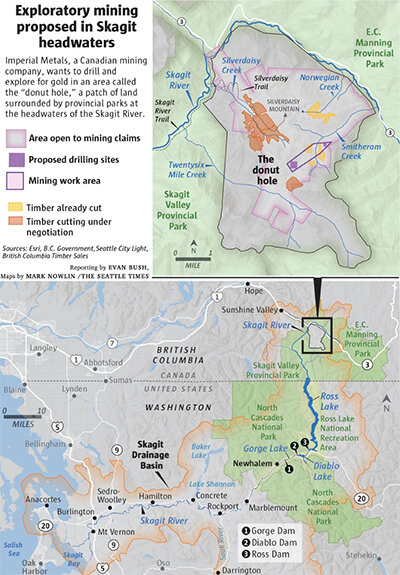 Map of Skagit headwaters. Courtesy image
Map of Skagit headwaters. Courtesy imageNew research published by Western Washington University’s Border Policy Research Institute (BPRI) shows cross-border news sources and advocacy groups’ impact on efforts to prevent mining in the Skagit River headwaters.
Derek Moscato, BPRI faculty fellow and associated professor of journalism at Western, looked at media outlets’ — in Washington and B.C. — focus on the Skagit watershed due to B.C.-based Imperial Metals pending application since 2019 to gold mine in an area that became known as the “Donut Hole.”
Mount Baker Experience was one of the nine sources cited in the research.
The Donut Hole, which the Skagit River runs through before crossing into Washington, is a Manhattan-sized chunk of unprotected land in B.C. sandwiched between E.C. Manning Provincial Park and Skagit Valley Provincial Park 15 miles from the U.S. border. It was subject to clear-cutting in 2018 but saved after an outpouring of public concern.
In January 2022, B.C. government announced it had halted mining in the Donut Hole following an agreement between it, Imperial Metals and Skagit Environmental Endowment Commission. The agreement came after an international coalition of U.S. and Canadian stakeholders banded together to petition against the proposed mining. A total of 280 local and state governments, tribes, businesses and other communities downriver and in B.C. signed on against the pending mining contract.
Moscato finds in the research that media, environment groups and nonprofits on both sides of the border were an influential force in shaping public opinion and formed a critical alliance.
“For policymakers, the Skagit River donut hole saga suggests that such environmental media is increasingly strategic, fluid, and aligned with broader global discourses,” Moscato writes. “At the same time, for all involved parties it suggests the value of early and sustained public engagement, media outreach, and cross-border dialogue.”